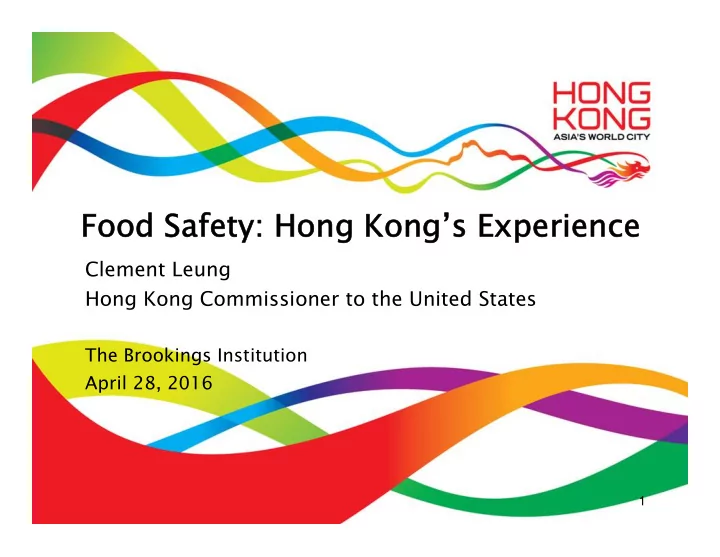

Food Safety: Hong Kong’s Experience Food Safety: Hong Kong’s Experience Clement Leung Hong Kong Commissioner to the United States The Brookings Institution April 28, 2016 1 1
Food Safety: Hong Kong’s Experience Food Safety: Hong Kong’s Experience Overview of Hong Kong’s food safety • regulatory system Our cooperation with Mainland China • Challenges of regulators and businesses • 2
Background Background “One Country, Two Systems” • Full autonomy in administering food safety; • e.g. treatment of U.S. beef products Imports 90% of food, 60% from Mainland • China (fresh produce, live food animals) 3
HK’s Food Safety System: 4 Pillars HK’s Food Safety System: 4 Pillars Legislation and enforcement • Risk management and surveillance • Risk communication • International cooperation • 4
Legislation and Enforcement Legislation and Enforcement Rule-based, specified limits on harmful • substances Registration of all food importers and • suppliers, and record keeping Powers to impose ban or mandatory recall • All food establishments to be licensed • Labelling of ingredients/nutrition information • Centre for Food Safety: multi-discipline team • 5
Risk Management and Surveillance Risk Management and Surveillance Regular, targeted, thematic, and seasonal • surveillance 65,000 samples tested every year/9 samples • per 1,000 population. Over 99% satisfactory Results released monthly with details and • posted on-line (immediate alert if serious) Contingency plans, exercises and drills (e.g. • nuclear incidents, avian flu, etc.) 6
Risk Communication Risk Communication Experts, food trade, and general public • Over 85% households have broadband access, • mobile penetration 240% Web site, Facebook, Apps, eNews, email/SMS • notifications – about 43,000 active accounts Trade consultation forums and consumer • liaison groups Strategy: open and transparent • 7
International Cooperation International Cooperation Alerts from overseas jurisdictions of food • incidents in exporting countries Monitor international food safety events and • assess potential impact on HK World Health Organization, Codex, World • Organization for Animal Health Expert Committee with HK, Mainland and • overseas experts 8
Cooperation with Mainland China Cooperation with Mainland China Registered farms and plants to qualify for • export to Hong Kong, health certificates, documentary trail Visit to farms and plants by HK inspectors • Agreed communication channels and • protocols for handling incidents (e.g. unsatisfactory samples) Not just “One Country, Two Systems”, but also • “One Country, Two Pigs” 9
Challenges: Build Legal Challenges: Build Legal Framework Framework Don’t make perfect the enemy of good • Go for something that can be implemented • and complied with Prepare to make trade-offs: stable supply, • compliance cost, private sector capability, grace periods, phased implementation 10
Challenges: Build Trust Challenges: Build Trust Credibility is everything, but … people • inherently do not trust regulators The more you test, the more problems you • find People believe in bad news rather than good • news “You must be hiding something from us” • 11
Challenges: Build Trust Challenges: Build Trust “When did you first know about it? Why has it • taken so long to tell us?” “You should have found it first” • “You should have found it earlier” • “Powell Doctrine”: deploy overwhelming strike • capability during a major food safety crisis Examples: Fukushima, low iodine infant • formula 12
Challenges: Build Capacity Challenges: Build Capacity Food safety is a very intensive government • operation Build capacity in the field but also tackle other • systemic weakness: business ethics, rule of law, transparency, accountability, coordination within government, etc. Long process: took Hong Kong more than 30 • years to get to where we are 13
Role of Businesses Role of Businesses Responsibilities and opportunities • Private sector can help upgrade skills, self- • regulate and provide reality check Rising middle class and growing market for • quality, branded food products Chinese enterprises to “Go Global” for know- • how and technology Food industry a major victim of food incidents • and a key partner to clean up the act 14
Prospects of Reform Prospects of Reform The building blocks are there – need to scale • up Challenges: 1.3 billion people, vast country, • small producers and suppliers, economy in transition, systemic issues Start with large cities first? • “One Country, One Pig”? • 15
Recommend
More recommend